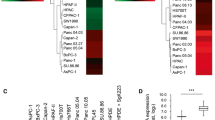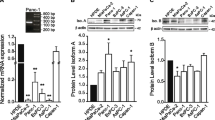Abstract
Background: The signal transduction pathways important in regulating the growth and differentiation of malignant cells are poorly understood. Recent evidence has implicated activation of the protein kinase C (PKC) family of signaling proteins in pancreatic carcinoma during cytokine-induced cytostasis and differentiation.
Methods: A human pancreatic adenocarcinoma (HPAC) cell line was exposed to tumor necrosis factor-α (TNF-α; 40 ng/ml) for 6 days. Cytostasis and viability were confirmed by daily MTT [(3(4,5)-dimethyl-thiazol-2-yl) 2,5-diphenyl-tetrazolium bromide] and trypan exclusion assay. Protein fractions were isolated daily and subjected to immunoblot analysis for the normal (terminally differentiated) pancreatic ductal cell marker carbonic anhydrase II (CA II) as well as specific PKC isoforms (α, β, γ, η, andζ).
Results: Growth arrest occurred in HPAC cells after exposure to TNF-α for 48 h, with viability maintained above 90% throughout the 6-day time course. CA II immunoreactivity was not detected in untreated controls but appeared after 2 days of TNF-α exposure, peaking on day 6. Concurrently, TNF-α induced the selective downregulation of PKC-α, whereas PKC-γ levels increased. PKC-β and PKC-η immunoreactivity did not change. The atypical PKC-ζ isoform developed a doublet banding pattern in response to TNF-α, although overall PKC-ζ levels did not change.
Conclusions: TNF-α-induced growth arrest and differentiation in HPAC cells is associated with the selective downregulation of PKC-α and upregulation of PKC-γ.
Similar content being viewed by others
References
Boring CC, Squires TS, Tong T, Montgomery S. Cancer statistics.CA Cancer J Clin 1994;44:7–26.
Cubilla AL, Fitzgerald PJ. Morphological lesions associated with human primary invasive nonendocrine pancreas cancer.Cancer Res 1976;36:2690–8.
Furukawa T, Chiba R, Kobari M, Matsuno S, Nagura H, Takahashi T. Varying grades of epithelial atypia in the pancreatic ducts of humans.Arch Pathol Lab Med 1994;118:227–34.
Witsell AL, Schook LB. Tumor necrosis factorα is an autocrine growth regulator during macrophage differentiation.Proc Natl Acad Sci U S A 1992;89:4754–8.
Rodriquez C, Roldan E, Navas G, Brieva JA. Essential role of tumor necrosis factorα in the differentiation of human tonsil inin vivo induced B cells capable of spontaneous and high-rate immunoglobulin secretion.Eur J Immunol 1993;23:1160–4.
Torti FM, Torti SV, Larrick JW, Ringold GM. Modulation of adipocyte differentiation by tumor necrosis factor and transforming growth factor beta.J Cell Biol 1989;108:1105–13.
Ip MM, Shoemaker SF, Darcy KM. Regulation of rat mammary epithelial cell proliferation and differentiation by tumor necrosis factorα.Endocrinology 1992;130(5):2833–44.
Franz MG, Winkler BC, Norman JG, Fabri PJ, Gower WR. Tumor necrosis factor alpha induces the expression of carbonic anhydrase II in pancreatic adenocarcinoma cells.Biochem Biophys Res Commun 1994;205:1815–21.
Franz MG, Winkler BC, Norman JG, Fabri PJ, Gower WR. Tumor necrosis factorα induces differentiation in a human pancreas cancer cell line [Abstract].Gastroenterology 1994;106:386.
Raitano AB, Scuderi P, Korc M. Long-term effect of tumor necrosis factor and gamma interferon in human pancreatic carcinoma cells.Int J Pancreatol 1990;6:109–18.
Schütze S, Scheurich P, Pfizenmaier K, Krönke M. Tumor necrosis factor signal transduction.J Biol Chem 1989;264:3562–7.
Wiegmann K, Schütze S, Kampen E, et al. Human 55-kDa receptor for tumor necrosis factor coupled to signal transduction cascades.J Biol Chem 1992;267:17997–8001.
Matsubara N, Fuchimoto S, Orita K. Tumor necrosis factor-alpha induces translocation of protein kinase C in tumor necrosis factor-sensitive cell lines.Immunology 1991;73:457–9.
Hug H, Sarre TF. Protein kinase C: divergence in signal transduction?Biochem J 1993;291:329–43.
Gower WR, Risch RM, Godellas CV, Fabri PJ. HPAC, a new human glucocorticoid-sensitive pancreatic ductal adenocarcinoma cell line.In Vitro Cell Dev Biol 1994;30A:151–61.
Towbin H, Staehlin T, Gordon J. Electrophoretic transfer of proteins from polyacrylamide gels to nitrocellulose sheets: procedure and some applications.Proc Natl Acad Sci U S A 1979;76:4350–4.
Leng L, Yu F, Dong L, et al. Differential modulation of protein kinase C isoforms in erythroleukemia during induced differentiation.Cancer Res 1993;53:5554–8.
Onoda K, Hagiwara M, Hachiya T, et al. Different expression of protein kinase C isozymes in pancreatic islet cells.Endocrinology 1990;126:1235–40.
DeValia V, Thomas NSB, Roberts W, et al. Down-regulation of human protein kinase Cα is associated with terminal neutrophil differentiation.Blood 1992;80:68–76.
Davidson LA, Jiang YH, Derr JN, et al. Protein kinase C isoforms in human and rat colonic mucosa.Arch Biochem Biophys 1994;312:547–53.
Craven PA, DeRubertis FR. Alterations in protein kinase C in 1,2-dimethylhydrazine induced colonic carcinogenesis.Cancer Res 1992;52:2216–21.
Delage S, Chastre E, Empereur S, et al. Increased protein kinase Cα expression in human colonic Caco-2 cells after insertion of human Ha-ras or polyoma virus middle t oncogenes.Cancer Res 1993;53:2762–70.
Fabro D, Kung W, Costa SD, et al. Involvement of protein kinase C in the growth regulation of human breast cancer cells.Cancer Treat Res 1992;61:229–48.
Blobe GC, Khan WA, Halpern AE, et al. Selective regulation of expression of protein kinase C beta isoenzymes occurs via alternative splicing.J Biol Chem 1993;268:10627–35.
Korc M, Meltzer P, Trent J. Enhanced expression of epidermal growth factor receptor correlates with alterations in chromosome 7 in human pancreatic carcinoma.Proc Natl Acad Sci U S A 1986;83:5141–4.
Pellegata NS, Sessa F, Renault B, et al. K-ras and p53 mutations in pancreatic cancer ductal and non-ductal tumors progress through different genetic lesions.Cancer Res 1994;54:1556–60.
Kolch W, Heidecker G, Kochs G, et al. Protein kinase Cα activates raf-1 by direct phosphorylation.Nature 1993;364:249–52.
Raitano AB, Scuderi P, Korc M. Binding and biological effects of tumor necrosis factor and gamma interferon in human pancreatic carcinoma cells.Pancreas 1990;5:267–77.
Scheurich P, Köbrich G, Pfizenmaier K. Antagonistic control of tumor necrosis factor receptors by protein kinases A and C.J Exp Med 1989;170:947–58.
Schütze S, Machleidt T, Krönke M. Mechanisms of tumor necrosis factor action.Semin Oncol 1992;19:16–24.
Taga T, Kishimoto T. Cytokine receptors and signal transduction.FASEB J 1992;6:3387–96.
Author information
Authors and Affiliations
Rights and permissions
About this article
Cite this article
Franz, M.G., Norman, J.G., Fabri, P.J. et al. Differentiation of pancreatic ductal carcinoma cells associated with selective expression of protein kinase C isoforms. Annals of Surgical Oncology 3, 564–569 (1996). https://doi.org/10.1007/BF02306090
Received:
Accepted:
Issue Date:
DOI: https://doi.org/10.1007/BF02306090




